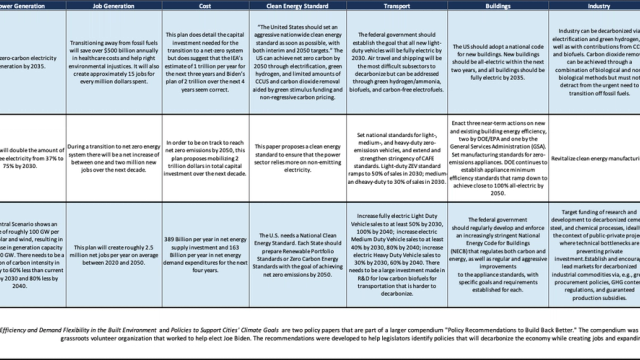Four Recent U.S. Net-Zero Emissions Reports in Review
On March 31, the Sustainable Development Solutions Network (SDSN) participated in a webinar, “Meeting the Climate Change Challenge: A Review of 4 Recent U.S. Reports”, that outlined comparisons between recent decarbonization roadmaps published by thought leaders in the field. Dr. Sue Tierney served as moderator and guided more than 361 attendees through presentations by the report authors. The webinar outlined key ways in which the reports aligned and differed in hopes of building additional consensus and awareness for decarbonization pathways in the next 10 years. While the specific methodology and technologies covered in the reports differed, there were a few common threads that resounded across them all.
Key areas of alignment between the reports include:
- All reports include carbon pricing as a key tool for implementation
- All reports highlight the need for creation of a Clean Energy Standard to spur decarbonization of the electricity sector, emphasizing the role of efficiency measures
- All reports agree that 50% or greater of new light duty vehicle sales should be electric by 2030
Key areas for which the report authors have varying proposals include the capital investment that needs to be made in the transition to a net-zero emissions system and the amount of jobs created by investments in the transition.
The four reports covered included:
Accelerating the US Clean Energy Transformation
December 2020, Renewable and Sustainable Energy Institute, University of Colorado Boulder: This report highlights policy opportunities and low-to-no-carbon solutions in 4 sectors: electricity, buildings, transportation, and industrial. Unique to this report is a section detailing carbon removal technologies.
Accelerating Decarbonization of the United States Energy System
February 2021, National Academies of Sciences, Engineering, and Medicine: NASEM’s report lays out key actions in the near term (2021-2030) to enable decarbonization by 2050, along with overarching technology and socio-economic goals to pursue in concert with decarbonization efforts. The report suggests both sector-specific and overall policies to speed the decarbonization transition.
America’s Zero Carbon Action Plan
October 2020, SDSN USA Zero Carbon Consortium : Developed by a consortium of policy experts, the ZCAP suggests a decarbonization policy framework anchored in technical modeling for achieving net-zero emissions that spans short-term, medium-term, and long-term action. ZCAP focuses on six key sectors (power generation, transportation, buildings, industry, sustainable land use, and materials), and details specific recommendations for policy at the federal, state, and local level as well as in the jobs sector.
Clean Energy for Biden Policy Recommendations
March 2020, Clean Energy for Biden: Comprised of 48 individual policy papers, these policy recommendations span eight categories: jobs and workforce; climate justice and equity; mobilizing public and private investment; transportation; energy system and grid; innovation and technology; just transition; and rural development. Two of these papers were presented at this event.
Access the slides shared by report authors during the webinar here.
Watch the webinar recording here.
Access the comparison matrix here.
A special thanks to High-Impact Events for hosting this webinar and to Leonard Ruyter-Harcourt for drafting the report comparison matrix.
